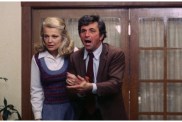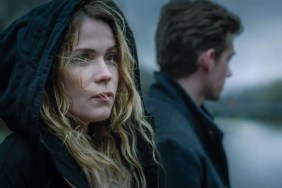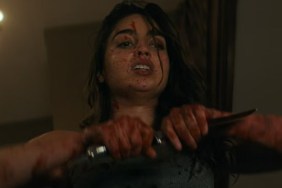
As much as criticism involves the intellectual assessment of elements like plotting and acting and so on, in the end what you really have to go by is ones gut reaction. That is: all logic and analysis aside, how did a movie make you feel? While I can objectively describe many excellent qualities that Byzantium possesses (hence the whole feeling bad about hating it thing), it doesnt change the fact that my reaction to the movie was one of pure boredom.
Initially I was definitely intrigued by this project. As a director, Neil Jordan is seldom mentioned as one of the genre greats but his résumé suggests he belongs at least on the outer circles of some fairly elite company. While his filmography is an eclectic one, and youd never be able to pin him down as specializing in any one type of film, his scattered genre outings over the years have always been intriguing. Youve got the artsy lycanthrope tale A Company of Wolves (1984), the big budget Anne Rice adaptation Interview with the Vampire (1994), the disturbing character study The Butcher Boy (1997), and the strange serial killer tale (spiked with a bit of parapsychology) In Dreams (1999). In Dreams didnt work for me (again, first impressions!) but the rest of those are all top shelf in my book.
Still, for whatever reasons, Jordans contributions to the genre remain somewhat underappreciated. Company of Wolves lacked the giddy spirit of the 80s more fondly remembered genre pics so I get why thats only a cult item at best but Vampire was a big success in its day, was generally well liked by fans, it starred two actors who remain huge movie stars today, and it featured some of Stan Winstons best work but yet when it comes to 90s vampire cinema, it seems like Interview is even less well remembered these days than Subspecies (1991). How is that even possible? I mean, if were talking Subspecies II: Bloodstone (1993) then I can understand but Subspecies? Come on.
Well, anyhow if those fine films havent been enough to keep Neil Jordans name on the lips of most horror fans, I think its safe to say that Byzantium wont do the trick either. Based on a 2008 play by Moira Buffini called “A Vampire Story,” Byzantium is a very pretty slog through centuries-worth of undead existence. And just by my saying that, I think you probably already know whether this movie is for you or not. Buffini penned the screenplay adaptation herself but without a familiarity with the play, I cant say whether she did her own work justice or not. What I can say is that Jordan has made a film of wonderfully lush imagery that brings together a strong, talented cast (including Gemma Arterton, Saoirse Ronan, Jonny Lee Miller, and Caleb Landry Jones) but the tale theyre telling feels anemic.
Arterton plays Clara, a brusque, hard edged nightclub worker who makes a living out of using her considerable sex appeal. Ronan plays her far more introverted companion Eleanor, a young girl who compulsively writes her life story in her diary only to tear the sheets out when shes done and literally cast them to the wind. As the movie unfolds, we learn the details of both women, the nature of their intense bond, and the secrets of their long history together. This involves many flashbacks to the days of the Napoleonic Wars, by the way, and you can imagine how exciting that gets.
In the present day, circumstances force Clara and Eleanor to flee to a sleepy British seaside resort town when they take refuge in the eponymously named hotel, a rundown establishment that, before long, has been transformed into a make-shift brothel by the no-nonsense, money-minded Clara. Complicating Claras efforts to keep her and Eleanor safe is Eleanors burgeoning attraction to Frank, a sickly young local (played by Jones) as well as Eleanors urge to tell the truth to other outsiders about her and Claras immortal affliction.
In time, we find out exactly how Clara and Eleanor came to be the bloodsuckers that they are and the revelations behind that involve a twist on vampire lore that proves to be the most intriguing aspect of the movie. Its something that would be unfair to reveal in a review but I will say that the gender politics involved are the sole reason that I didnt feel my time was totally wasted with Byzantium.
In tandem with that, we also have more light shed on Claras stubbornly anti-intellectual attitude (after centuries of living, shes remained deliberately uneducated shunning any quest for knowledge) and while the full disclosure of her backstory makes her considerably more sympathetic than she previously had been, it all comes too late in the film to make much difference.
For all the strong performances, for all the lovely imagery (the cascading waterfall of blood will likely to stick in the memories of viewers for some time), and for all of its minor tweaks on vampire mythology (always appreciated in such well-worn territory), the plain truth is that I just wasnt drawn into Byzantium. At one point, the 1966 Hammer gem Dracula: Prince of Darkness is seen playing on television and I wouldve been very happy if the camera had just stayed glued to that TV for the duration of the movie.
Some will appreciate Byzantium much more than I did. Maybe those people have better taste than I do. For instance, I had a perfectly fine time with Arterons previous genre outing, the highly goofy Hansel and Gretel: Witch Hunters, so take that as you will. More pointedly, as far as recent vampire cinema goes, I much preferred Tim Burtons Dark Shadows to this. In the end, I wouldnt call Byzantium a bad movie and I wouldnt discourage anyone with a curiosity about it from seeing it. We just werent made for each other and I suspect even if I lived a life span worthy of a vampire, that wouldnt change.
Stay up to date with the latest horror news by “liking” Shock Till You Drop’s Facebook page and following us on Twitter!









